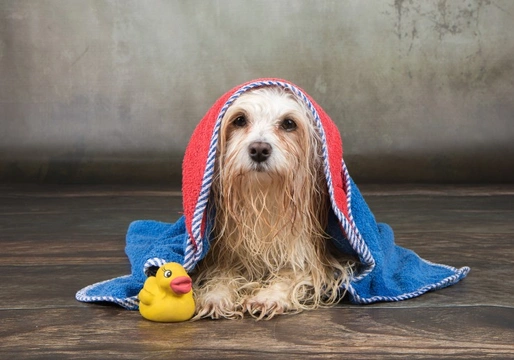
How regularly do dogs need to be bathed?
Unlike cats, who never need to be bathed without a good reason and so, may go their whole lives without a bath, dogs need to be bathed and groomed regularly to stop them from smelling bad, keep their skin and coat in good condition, and avoid problems.
Never bathing your dog will mean that their skin and coat get very dirty, and this will not go away on its own, which will soon lead to your dog smelling awful and potentially suffering from congested skin that can cause spots, sore areas and itching and discomfort. However, it is important not to bathe your dog too often either, as this can cause problems of its own including stripping the skin and coat of its natural oils, leading to dry skin and irritations.
It can be hard for dog owners to know exactly how often their dogs need to be bathed-and there is no set answer to this that works for every dog. In order to know how regularly you should bathe your dog, you will need to take into account a variety of factors including their breed and so, what type of coat they have, their lifestyle, how messy they get, and if they have any skin or coat problems.
In this article, we will look at the various factors to consider when determining whether or not your dog needs to be bathed, to help you to work out how often you should bathe them. Read on to learn more.
Your dog’s skin and coat
The type of coat that your dog has, which is in large part determined by their breeding, is a big part of what dictates how often your dog should be bathed. Dogs that have short, single-layered fur such as the whippet, will have less fur to repel dirt and muck, but also, less fur to harbour it as well-which means that their coats may appear to be clean and in good condition, but they could have a lot of dirt and muck on their skin that builds up reasonably quickly.
Breeds with very thick, heavy coats are apt to smell worse when they are dirty as they have more hair, but this coat also helps to protect the skin and repel dirt, and also has more surface area for the oils from the skin to coat in order to keep it healthy and in good condition. This means that while bathing a dog with a thick, heavy coat is likely to be a major undertaking when compared to their less hairy counterparts, they will also need to be bathed less often as a result.
Breeds with little or no fur like the hairless Chinese crested dog need to be bathed the most-every couple of weeks on average!
Shedding and coat cycles
A dog that is shedding their coat heavily may benefit from a bath to help to remove shed hair and stimulate the new hair growth, as well as needing daily grooming and brushing when going through a moult. Dogs that don’t shed much and breeds that tend to retain the hair that they do shed within their coats, like the poodle, also need to be bathed to remove the tangled hair and prevent knots, but benefit much more from regular brushing and grooming in terms of removing shed fur.
Activity levels
Dogs that are highly active, very lively and that spend a lot of time outside tend to need to be bathed more than less active dogs, because they are more likely to get mucky and get rained on, which all contribute to making a mess of the coat, and providing the right type of environment within the fur to allow bacteria that causes bad smells to grow and thrive.
However, such dogs that are out and about in all weathers also benefit from the oils in their coat that help to protect it from the elements and keep the skin healthy, and so you should only bathe your dog when they actually need a bath, and use very mild products if they need to be bathed regularly.
Mucky pups
Dogs that can’t seem to keep themselves clean for more than five minutes and that are apt to make a beeline for stinky, mucky and otherwise messy things when out on walks will of course need to be bathed more often than dogs that avoid puddles and mess! If your dog has got something nasty in their coat or rolled in something foul-smelling, a bath may be unavoidable.
However, again, regular brushing and grooming can help to cut down on the need for baths, and using wipes or cloths to clean off localised messes can again help to reduce the frequency that the dog needs to be bathed.
Skin problems and conditions
There are a reasonably large number of different skin problems and conditions that can affect dogs, including allergenic flare-ups, chronic conditions and a range of breed-specific problems, as well as issues such as parasite infestations and similar issues.
How often a dog with a skin condition or other issue needs to be bathed can be variable-for some such dogs, regular bathing with the appropriate products is an important part of treatment and management, while for other dogs, too much bathing can actually exacerbate the condition.
Your vet will be able to advise you on how to care for your dog’s coat and skin within the remit of their specific problems, and provide guidance on how often to bath your dog, and how to do it.



